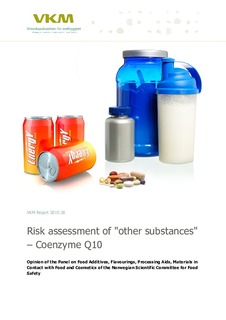Risk assessment of "other substances" – Coenzyme Q10. Opinion of the Panel on Food Additives, Flavourings, Processing Aids, Materials in Contact with Food and Cosmetics of the Norwegian Scientific Committee for Food Safety
Herlofson, Bente Brokstad; Mathisen, Gro Haarklou; Bruzell, Ellen Merete; Granum, Berit; Hetland, Ragna Bogen; Husøy, Trine; Rohloff, Jens; Wicklund, Trude; Steffensen, Inger-Lise
Research report
Published version
Permanent lenke
http://hdl.handle.net/11250/2461129Utgivelsesdato
2015Metadata
Vis full innførselSamlinger
- Institutt for biologi [2615]
- Publikasjoner fra CRIStin - NTNU [38690]
Sammendrag
The Norwegian Scientific Committee for Food Safety (VKM) has, at the request of the Norwegian Food Safety Authority, assessed the risk of intake of 100 mg/day of coenzyme Q10 in food supplements. For the risk characterization, the values used for comparison with the estimated exposure are 900 mg/day (corresponding to 12.9 mg/kg bw per day in a 70 kg adult) based on human studies (4 weeks) and the NOAEL of 1200 mg/kg bw per day based on a long-term toxicity study in rats (52 weeks). No specific studies on children (10 to <14 years) and adolescents (14 to <18 years) were identified. Based on the included literature there was no evidence indicating that age affects tolerance for CoQ10. Therefore, a tolerance as for adults, based on body weight, was assumed for children and adolescents, in the comparison with human data.
VKM concludes that it is unlikely that a daily dose of 100 mg of CoQ10 from food supplements causes adverse health effects in children (10 to <14 years), adolescents (14 to <18 years) and adults (≥18 years).
